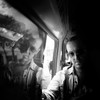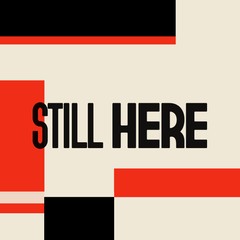On May 25th a reckoning with systemic racism was reignited. It's still here — and so are we.
Advertisement
It hit Henríquez especially hard, not only because of the color of his skin, or the fact that he and Floyd share the same first name, but because he has become a police target himself as a prominent organizer and activist in the growing opposition movement to Nicaragua’s authoritarian president, Daniel Ortega.“I have the police constantly by my house, during the morning, during the evening, during the night,” he said in a telephone interview with VICE World News, speaking in English inflected with the cadence and syntax of Nicaragua’s Afro-descendants. “And they line up these shotguns and AKs, they are standing in front of my house guaranteeing that I don't come out to assist in some meeting or whatnot.”That police harassment might have scared him away from his activism. Instead, he plunged in further.In January, he announced that he would compete against other opposition leaders in the race to select a single candidate to challenge Ortega in the November 7 general election. His quest is quixotic, but the visibility his ambition brings to Nicaragua’s long-marginalized Afro-descendant population may help to shatter long-held prejudices against his community. Some of the initial reactions to his candidacy suggested just how difficult that may be.
Advertisement
Henríquez recalled that after he announced his candidacy to lead the opposition coalition, a well-known lawyer, José Manuel Urbina, who is allied to a right-wing party, posted a photo of Henríquez on Facebook under a diatribe that he labeled “Candidacies: The New Pandemic.”“How barbaric! How vulgar! Now even a cousin of Bob Marley is running for president,” Urbina wrote.Henríquez, 35, took it in his stride. He’s accustomed to people judging him for his dreadlocks, his earrings and casual clothes, although he has a master’s degree in gender, ethnicity and intercultural citizenship and is one of the most high-profile voices in the region, which is known as the Mosquito Coast. Nicaragua is plagued by “institutional” and “structural” racism, he said.“There is racism against the Black population. There is racism against the Indigenous population. There's racism against the geographical area that you belong to,” said Henríquez.“They got surprised that someone from the coast is launching a candidacy for president of the country, because they are used to seeing people from the Mosquito Coast launching themselves in baseball, basketball, music, dancing, modeling. Now, we’re breaking the stereotype.”The Atlantic Coast of Central America has a large Afro-descendant population, stretching from Belize to Panama. Nicaragua’s Black community represents about 9 percent of the population, but as in many of the countries in the region, their political demands are largely ignored. The majority of Nicaragua's economic hubs and big cities, including the capital Managua, are along the western coast of the country.
Advertisement
Henríquez said that when he and others from the Mosquito Coast travel to the other side of the country, they place themselves at risk because of long-held prejudices from the “Spanish-speaking colonists.”“The stereotype that people coming from the Caribbean coast, that dress good, that [have] a car, they assume that you're a narco trafficker, they assume that you are a drug dealer, and they assume that everything you have is coming from drugs,” he said. “So this automatically puts you on the spot for the institutions and for the police.”On the Atlantic Coast, many of the cops come from local communities, which reduces some of the policing bias, but police units that come from other parts of the country to patrol the region are more abusive. Throughout his conversation with VICE World News, Henríquez repeatedly called the Nicaraguan police “Babylon”—a Rastafari word used to refer to institutions and structures that oppress the people.He recalled the 2019 death of a Black man in Nicaragua known only as Barabas who was running from the police and, in an attempt to escape, jumped into the water off the Bluefields docks.“He couldn't swim, and the police officers jumped in a small speedboat and they literally watched him drown,” Henríquez said. “All they needed to do was to give him their hand.”The death of George Floyd and Barabas deeply affected Henríquez and his community, just two of the many cases in the United States and Nicaragua where Black people have been killed by the police.
Advertisement
He said he believes that his candidacy will hold out hope for all the disenfranchised populations in Nicaragua at a time when the coronavirus pandemic and political upheaval have plunged the country into its worst crisis since the civil war of the 1980s.In 2018, Nicaraguans rose up in a rebellion against the strongman rule imposed by Ortega and first lady Rosario Murillo. Initial demonstrations against a reform to the social security system were brutally repressed, and the response was a widespread insurrection across Nicaraguan society. The government crushed the protests, sending security forces and masked paramilitaries against the population in a crackdown that killed at least 300 people. Hundreds more were injured or imprisoned. Among the dead was a Bluefields journalist who was shot while he was live-streaming his protest at the beginning of the uprising. In September 2018, Ortega banned protests, and “Babylon,” as Henríquez said, has become a constant and ominous presence around the country.Ahead of the elections, in which Ortega, 75, is running for a fourth consecutive term, the government has passed a series of laws and recently stacked the electoral commission to assure his victory. A survey last year found that approval for Ortega, who first led the country in the 1980s after the 1979 Sandinista Revolution overthrew the dictatorship of Anastasio Somoza, had dropped to below 20 percent. But the opposition remains divided ahead of a deadline to choose a unity candidate to run against Ortega. Six parties came together to create an opposition coalition to pick a single candidate to run against the president, with Henríquez at first representing the indigenous YATAMA party. But the selection process has been marked by infighting and YATAMA left the coalition. Other parties have yet to join the alliance. Through it all, Henríquez’s determination has not faltered and he has remained in the race as an independent. While all the opposition candidates are united in the goal of removing Ortega from power, Henríquez campaign and platform is unique to the others, focusing on rights for the marginalized Mosquito Coast whereas the rest of the candidates hail from the Spanish areas of the country.“Our fight and our demands go beyond the traditional political party, because our struggle is for our land, our territory, our autonomy, our language, our identity, our way of living,” said Henríquez. “Our priority is not an ideology of left or right or Leninism or Marxism or communism or any of those ‘isms’. Ours is for existence within our own country.”

